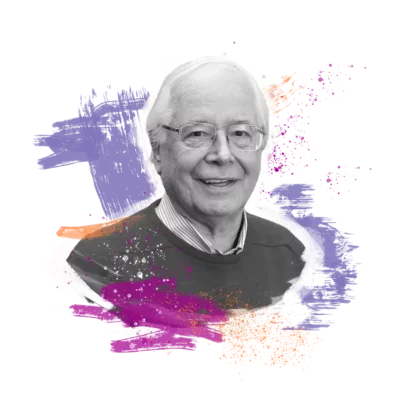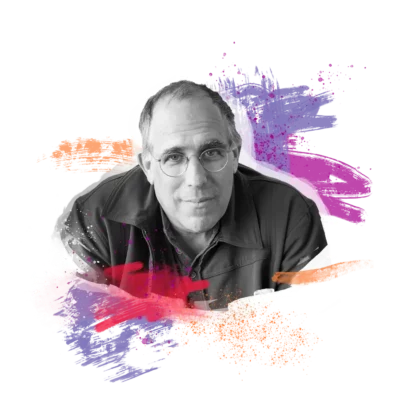Stick with it
When you fall in love with a project, stay with it – for as many years as necessary. Its time will come. When screenwriter Allan Scott acquired the film rights to the Walter Tevis novel “The Queen’s Gambit,” he couldn’t have imagined it would take almost 30 years to get that movie made. Allan, along with executive producer Bill Horberg, talk about their long road to turning the cult-favorite book into a Netflix phenomenon; the creative insights (and the key partner) that unblocked the path; and what they’ve learned about staying the course when the world is telling you no.
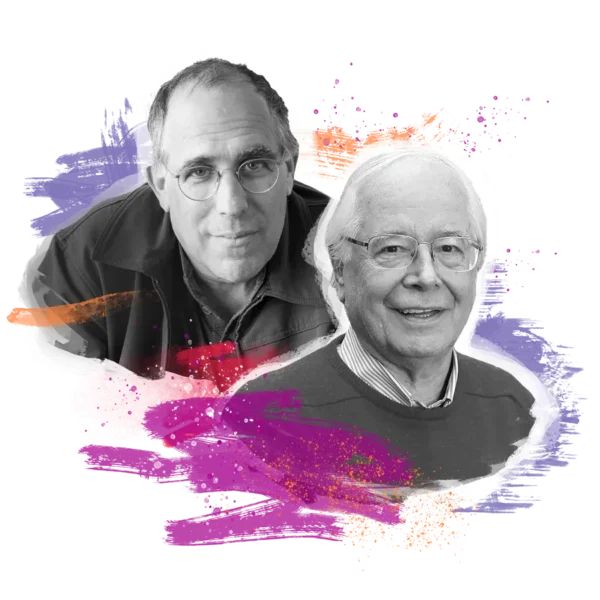
Transcript
Table of Contents:
Transcript:
Stick with it
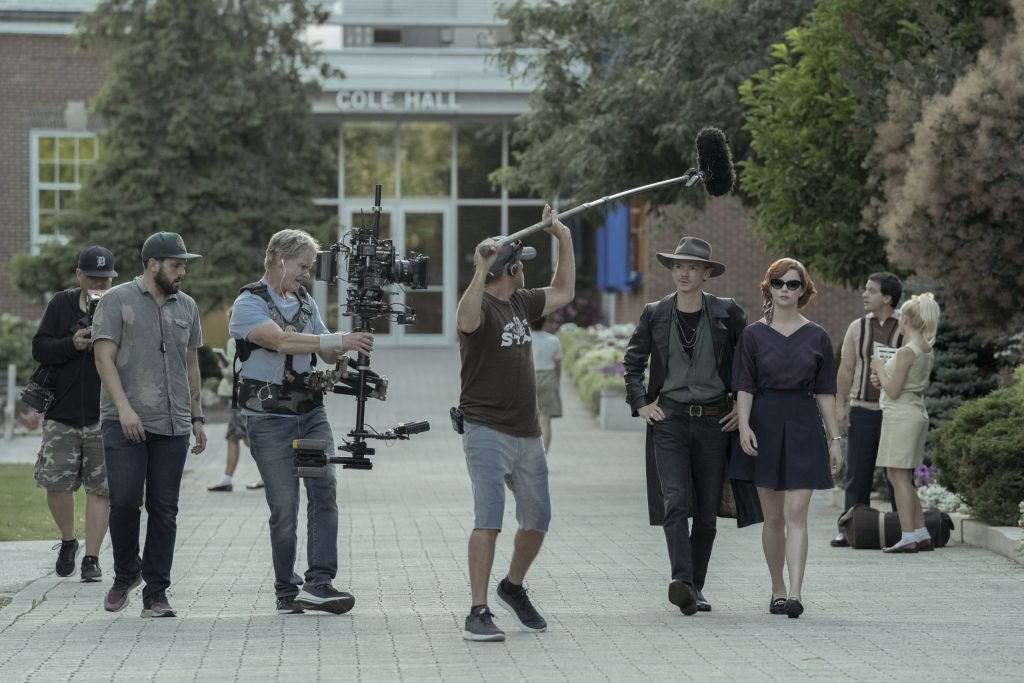
The long road to this shoot for The Queen’s Gambit in 2020 (featuring Thomas Brodie-Sangster as Benny and Anya Taylor-Joy as Beth Harmon) begins in another century. Photo: Ken Woroner/Netflix © 2020
Chapter 1: The next one
ALLAN SCOTT: People always ask me: “What’s your favorite film that you’ve ever made?” I’ve made over 20. And the truthful answer is the next one. I couldn’t write the next one if I didn’t think it was going to be the best one.
One day, the wonderful British director [Nic Roeg] came to me and said, “Read this book. I think you’ll like it.” And he gave me a paperback copy of The Queen’s Gambit. I came to the point where she was adopted as an orphan and beat the janitor at chess. Before page 25 I knew there was a very important story there, you know it right away.
From time to time, the theater can blow you away. I was most blown away, I think in my life by West Side Story. I saw West Side Story when I was young. I couldn’t believe that a movie could move you so much. That’s why we all go to the theater or go to the movies.
You generally need to have at least three moments where the audience is touched to the heart. The Queen’s Gambit just touched all the right emotional buttons all the way through. I was able to get an option on the material. So I went off and I wrote a draft. I don’t understand why we couldn’t get The Queen’s Gambit made. I still don’t understand that. It’s a hell of a good story.
JUNE COHEN: That’s Allan Scott, the co-writer and co-creator of the massively popular Netflix miniseries The Queen’s Gambit. He’s about to tell us the story of his 30-year journey to get it made. He’ll be joined mid-way through the story by his fellow executive producer Bill Horberg – just as it happened in real life.
Now this is a specific story about two movie producers determined to turn a novel about a chess player into a movie. But it’s also a universal story about the perseverance it takes to bring a creative work across the finish line.
As Allan and Bill take us on this decades-long journey of creating The Queen’s Gambit, you’ll hear the seemingly endless string of directors, scripts, and financiers they went through, and how their passionate belief in the project kept them going.
You’ll hear their strong shared belief that when you get a rejection, it doesn’t mean your project can’t succeed. It just means you haven’t found the right people at the right time with the right elements to bring it to life. And you’ll also hear how creative success comes from being persistent in what you believe is right – but willing to re-think what that looks like.
A few things you should know. If you haven’t seen The Queen’s Gambit on Netflix, you’re one of the few. It is now the most watched series in streaming history. It’s about a chess prodigy, Beth Harmon, and her troubled journey from orphan to chess grandmaster. It’s based on the 1983 novel by Walter Tevis.
Allan Scott and Bill Horberg are the producing team that worked for decades to bring The Queen’s Gambit to life. Allan, who you heard in chapter one, is an oscar-nominated screenwriter who has written over 20 movies. He was also CEO of Macallan, the Scotch Whiskey distillery – but that’s a totally different story. On his part, Bill has executive produced more than 40 movies, including the other iconic chess movie, Searching for Bobby Fischer. As a listener, it might be useful to remember that Allan has the Scottish accent. And when you hear them mention Scott Frank, remember that he’s the one who ultimately directed The Queen’s Gambit and co-wrote the Netflix series with Allan.
The original music you’ll hear is our composer Hil Jaeger, playing along with the story. And for visuals while you’re listening – go to sparkandfire.com/QueensGambit.
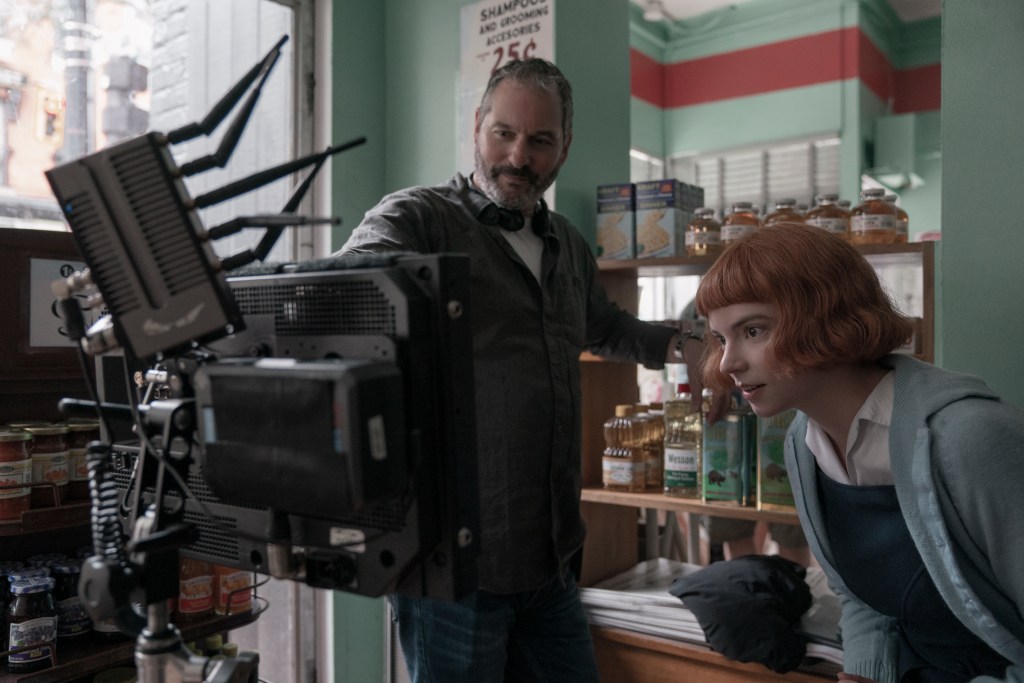
Director, writer and executive producer Scott Frank (here with Anya Taylor-Joy as Beth) was key to bringing the project to Netflix, where the two-hour movie could be re-imagined as a multi-hour miniseries — unlocking the book’s dramatic potential. Photo: Ken Woroner/Netflix © 2020
[Theme music]
Chapter 2: Failed opening moves
JUNE COHEN: How do you find the right creative partners? Be prepared for a long journey – and wait for the right people with the right elements at the right time.
ALLAN SCOTT: Four or five different directors wanted to make the movie. I did this over a period of many, many years. And, you know, these processes take forever. You sit down with a new director or one you haven’t met, but you do those things because you think they’ve got a shot. There wasn’t a studio in the world that wanted to do a chess movie: “We love your work. We love the script. Bring us something else.”
Bertolucci was the first director I worked with. And we used to go to an Italian restaurant for lunch every week. And I would sit down with him and say, “Now, Bernardo, let’s talk about what we need to do.” He said, “It’s all right. You wrote the script. You have the script.” I said, “Yes. And you liked it, I think.” He said, “I loved it.” I said, “Yeah, but what do you want to change?” “Nothing. Nothing. We just shoot.” And we couldn’t get it together.
And then proceeded to work with the wonderful Danish director Thomas Vinterberg. He was, at that time, the hottest young director in the world. At the end of our long weekend together, I said, “Okay. How do I get you to commit?” He said, “What I do, this is my process: I rent a house in the countryside in Denmark with you, me, two of my line producers, the art director, the composer. And we all share the house for about two months. And we talk about the project every day.”
I said, “Thomas, I’m too old to do that. I’m not going to spend two months in a house in the middle of the Danish countryside with six people I don’t know.” So I guess I turned him down. I thought he turned me down.
But then, many years later, I finally found a director who was acceptable to all the studios. And he happened to be a director who’d never directed a movie in his entire life, and it was Heath Ledger. And Heath was just great. He called me out of the blue. I didn’t know him. I went to New York to his house to look at his movie shorts and documentaries and commercials and music videos.
You could see in 10 minutes that the guy knew how to do this. And he was absolutely rock-solid on the story. We had quite a lot of debate as to whether we needed three actresses or just two. He said a girl of 14 can play the role right up to 23 or 24. And I said, “I’m not sure you’re right about that. If you have a girl of 14, you sure as hell have to lose the love scenes in the story,” because you can’t have a 14-year-old girl now playing 18 or 19 doing that. So that was the only point of contention between us.
He was just a very wonderful human being. He was in New York, and I was in London. And one day I spoke to him, we were talking about the music, he knew nothing about the music of the period. And I’m glad to say that was my high point in music. I’d given him a whole raft of things I thought were suitable. At 7, 8 o’clock we hung up, and the following morning I learned he died three hours later. And it was such a shock to me. I was so fond of him by then that I just sort of lost heart in the project.
JUNE COHEN: You probably heard the heartbreak in Allan’s voice when he speaks of Heath Ledger’s death. Did you also notice his tone when he said: “You stick with it because you think it’s got a shot.” You can hear in his voice the persistence the project took. And also: the courage. Because Allan wasn’t just looking for ANY opportunity, he was looking for the right people at the right time with the right elements for him and the project. And if any piece of that was amiss – like a requirement to live in the countryside with strangers – he walked away. And so can you.
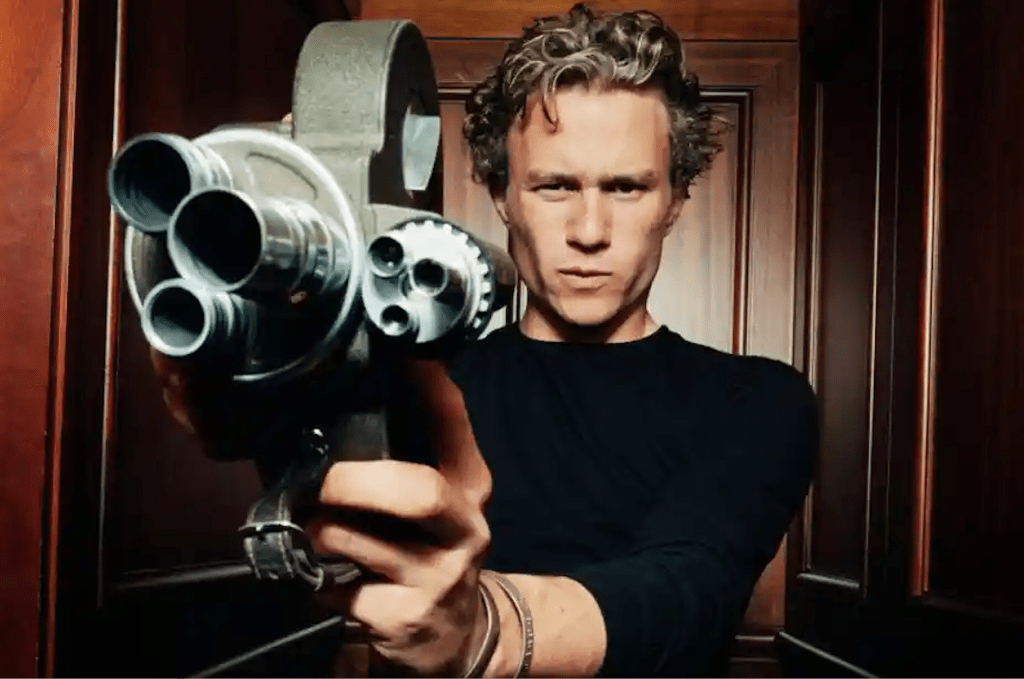
The actor Heath Ledger had made shorts, docs and music videos, but he had never directed a full-length film before; still, as Allan Scott says, “You could see in 10 minutes that the guy knew how to do this.” He had a personal connection to the story of the film as well: Ledger was a serious chess player. He’d been an Australian champion at age 10, and played every day in Washington Square Park. This image comes from Spike TV’s documentary “I Am Heath Ledger.”
Chapter 3: 1992, Bill Horberg enters the scene
ALLAN SCOTT: Bill, there, managed to make Searching for Bobby Fischer. And it was a damn good movie. It was the other good chess player besides Beth Harmon.
BILL HORBERG: In 1992, I was producing, Searching for Bobby Fischer.
At the same time, I was producing a television series for Showtime called Fallen Angels. And two of the writers on that television series were Allen Scott and Scott Frank. So in that one moment, I had chess, I had Scott, and I had Allen, but they were all completely siloed. And I had no idea as I was working with Allen of the existence of The Queen’s Gambit or that he himself had anything to do with it, or the rights to it.
ALLAN SCOTT: When that came out, I thought, “Well, that’s me dead forever, because they’ve made it.” But maybe the studios, now they’ll see that films can make money even if they’re about chess. But I still didn’t get any studios running to say, “Let’s make your chess movie.”
BILL HORBERG: I got to meet Michael Ondaatje, and we were having dinner, and Ondaatje just started to wax poetic about books that he loved. And he just went on and on about The Queen’s Gambit and Walter Tevis and how this was a book that he himself read every couple of years to remind himself how to write. And I was like, “Wow, this guy is not a slouch. If this is his kind of text and touchstone, I’ve got to read this book.”
By the second page I was hooked. I just felt like, “God, I got to know what happens next to this little girl.” He’s just got words lined up one after another for a couple of paragraphs here, but he somehow put the right words in the right order with the right inflection. And I went back to reread it and go, “How did this guy do this?”
I devoured the book in one sitting, and I loved it, and I put it down, and I said, “Why hasn’t anybody made this as a film? It’s just such an obvious movie.” I started to, on my own, try to track down the rights to the book, and through a kind of circuitous path, ended up finding out that they were controlled by Scottish gentleman who was a screenwriter named Allan Scott. I was like, “Wait a second. I know Allen Scott. I’m going to call him up and see what the hell ever happened with this.”
JUNE COHEN: In case you didn’t quite catch the name of the writer who pointed Bill to The Queen’s Gambit, it was novelist Michael Ondaatje, who wrote The English Patient. And did you notice why Michael recommended The Queen’s Gambit? It was a book he re-read when he needed to remember how to write. And it’s worth asking yourself: What does that for you, in your field?
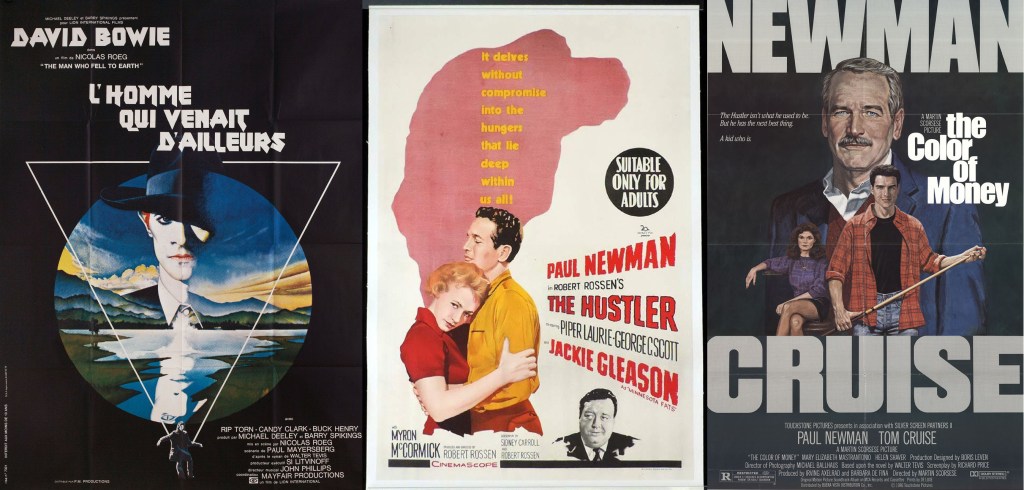
Known as a writer’s writer, Walter Tevis wrote several other novels that have been turned into films, including Nic Roeg’s David Bowie-starrer “The Man Who Fell to Earth”; the classic pool movie “The Hustler”; and its sequel, “The Color of Money.”
Chapter 4: You have to fall in love
How do you bounce back after yet another rejection? If it’s the right project, you won’t have a choice.
BILL HORBERG: I reached out to Allen and told him of my love of the book. It seemed like it was probably at a moment between these many directors, and I said, “Could I throw in with you?” He very graciously offered to work together to see if we could find a solution to getting this made.
Again, a number of terrific directors read the material, came and met with us. For me, it was probably about 10 years. Allen had already been at it for 20. There was never a year where it wasn’t almost about to get made. I assumed I was going to be making this movie. It just found a reason to not happen, often at the last minute. At some point you beat your head against the wall, and you go, “Man, maybe this is just not meant to be.”
I don’t believe that there’s a kind of rational marketplace. If I’m getting rejections, it’s not like I think the person who’s rejecting this has the truth. I just think I haven’t found the right person at the right time and the right elements and the right combination to make it happen.
You have to start not with the like, you have to fall in love. It doesn’t happen that often. But when you do and you get knocked over by something, you know that feeling and you don’t want to give it up.
Just to get anything made is such an epic uphill struggle that stick-to-it-iveness is an essential thing for anybody who’s going to pursue a creative path. If you were to turn away at any of the points offered to you to get off the path, you will. But then when you get so close and you’ve also invested so much of yourself in that process, it’s very hard to let go of that and walk away.
The only way to do it is if you can’t not do it, because if you can not do it, eventually you will not do it. But if it’s like breathing or sex and you just have to do it, as part of living, you need that element of perseverance. When you find a good story, you are going to get this thing made or die trying.
JUNE COHEN: Did you notice the tone in Bill’s voice when he said, “Maybe this is just not meant to be?” If you’ve stuck with a creative project over time you know that feeling. But did you also hear where Bill went next? He said he never believes the person who’s rejecting the project has the truth. He believes he just hasn’t found the right person at the right time with the right elements to make it happen. And that’s the formula you can keep with you during the inevitable tough times.
After the break: Netflix enters the scene and changes the game.
Chapter 5: Lining up the pieces
After years of failed attempts, how can you finally score a win? Change the game you’re playing.
BILL HORBERG: Years later, Scott Frank went and made Godless as a limited series for Netflix and he had success critically, commercially. They asked him what he wanted to do next and he called me up and he said, “I really would love to bring The Queen’s Gambit to Netflix. What do you think about changing this and telling this story in a much longer format?”
ALLAN SCOTT: I knew immediately that if we did it as a Netflix type production, each episode would have a cliffhanger. I remember the first time I ever did a big drama for American television was a CBS show I did, oh, 25 years ago. And as I was finishing writing the screenplay and adapting it. somebody said, “You need to do four act breaks an hour.”
And I discovered that rather than interrupting the flow of my story, they were really great places to put in little cliffhangers. Before the commercial break: was she going to collapse or was she going to push through? And I found this quite exciting.
She becomes addicted to drugs and discovers that in Mexico you can buy them without a prescription. My favorite ending is the ending of that episode, where you just see her in the chemist, and he gives her something, and you go to a close up of, and she just says, “Más.” I just love the idea.
BILL HORBERG: Allan and Scott, very carefully, decided on beginnings and endings for every episode.
And that’s what the longer telling allowed for, was then to not only embrace that material from the book, but in some ways to find the nuances that were implied in the book but weren’t dramatized. That then became the basis for the collaboration of Scott and Allan and myself.
ALLAN SCOTT: The great failing of the Netflix type broadcaster is that they pad out a 90-minute drama into eight hours. And it often doesn’t pad. Of all the stories that I knew, The Queen’s Gambit would easily make 7 or 8 hours.
BILL HORBERG: Netflix needed to read a couple of scripts. And we had to do the actual budgeting process. The conversation was really just: We think this is probably a smaller target than Godless. So the budget that we’re going to propose to you is significantly less than that. But if you guys can make it within this amount of money, we want to make it. The project was greenlit before it was even written.
JUNE COHEN: So after all this time, it was one key “yes” that allowed Allan and Bill to finally assemble the right people at the right time with the right elements. But it feels important to notice: The Queen’s Gambit had now completely changed shape. It was a seven-hour streaming series, not a two-hour feature film. But it felt creatively right. And their willingness to both stick to their principles – and also completely rethink them – is what made it possible.
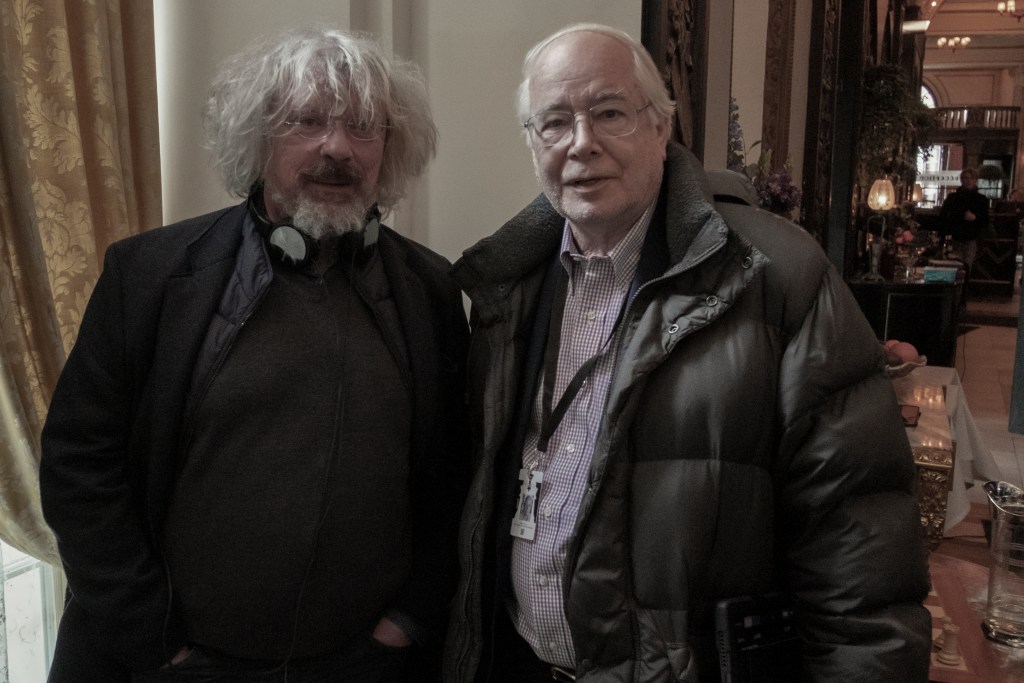
Over the years, one common objection to making The Queen’s Gambit was its many locations, from Mexico City, Moscow and Paris to Lexington, Kentucky, which would make it very expensive to shoot. To solve that problem for Netflix, the filmmakers scouted locations across Berlin that could stand in for all the major cities. On set, line producer Marcus Logens, left, poses with co-creator and executive producer Allan Scott. Photo: Phil Bray/Netflix © 20200
Chapter 6: Casting Anya Taylor-Joy
How do you engineer a creative breakthrough? Search relentlessly for the right people, and then trust them to take a risk.
ALLAN SCOTT: There isn’t practically a frame of the story that she isn’t in. It had to be somebody whose whole demeanor held you enthralled. And I think that’s the thing I saw first about her. I thought she’s also just a little bit weird. And, of course, weirdness helps when you’re talking about genius. Because one of the subtexts of the story is the line between genius and madness. It was just completely who she was. We were all of us, I think, totally confident in Anya from the get-go.
BILL HORBERG: If Allan and I were trying to make The Queen’s Gambit independently, there was no world where we would have been able to cast Anya Taylor-Joy in the lead. Independent films are able to really take a bet on somebody who’s a rising star, but with Netflix, we were able to just get, in almost every case, our first choice.
Scott rang them up and they said, “Great, send it to her.” She read it and loved it and had lunch with him and said, “I’m in.”
It wasn’t your typical development hell at all. The person who had the power of decision-making, she trusted Scott, knew that he could deliver. It was a team that she felt, you know, “I don’t have a lot of questions about their ability to execute this.” And that’s not my experience for 99% of the things I’d made. That level of support in a filmmaker and hands-off, but not in a disinterested way, it was in an empowering way.
There was another actress who was supposed to play the mom who fell out at the last minute because of scheduling issues. Scott had the notion to cast Marielle Heller, who was just a friend of his, but she wasn’t known to the world as an actress at all and had nothing to show. There was no tape. It was just, “I believe she can do this.” And there’s no other studio head in the world who would have said, “I trust you. Go with God, cast her.” It’s the second lead in the series. But they said yes overnight.
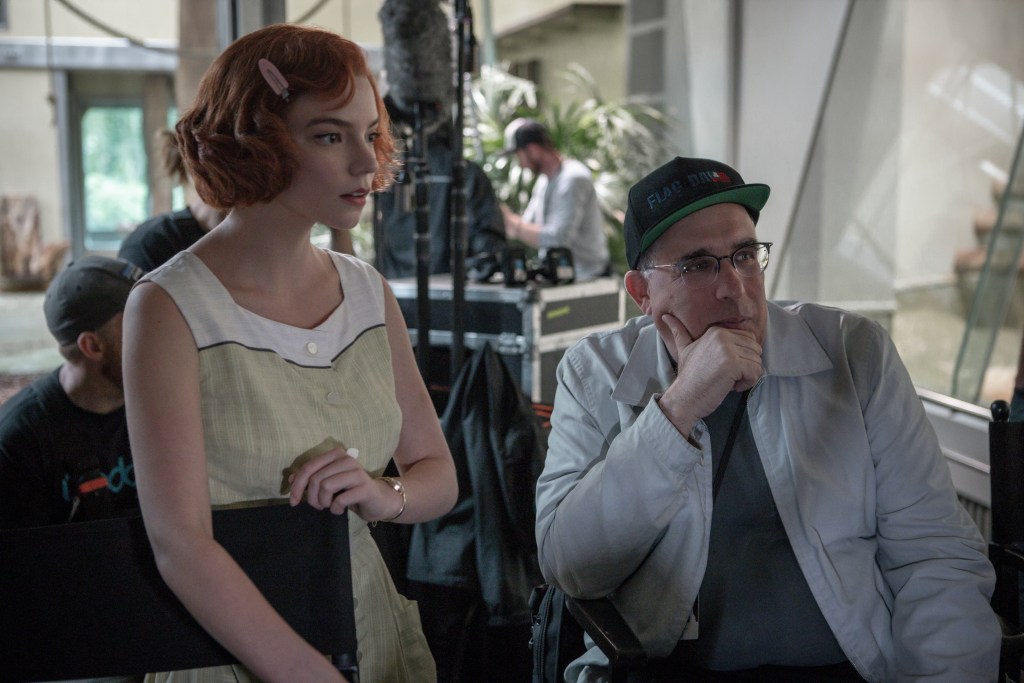
Anya Taylor-Joy as Beth Harmon, along with executive producer Bill Horberg, filming episode 103. Photo: Phil Bray/Netflix © 2020
Chapter 7: Epic battles
How do you avoid conflict with your creative partners? You actually shouldn’t. Just know the difference between disagreeing and being disagreeable.
BILL HORBERG: You have to have tension. You have to have some honest conflict through something for it to get strong. These movies get made well out of the fires. Not that people have to be disagreeable or rude or any of the myriad offensive behaviors that we’re associated with in Hollywood. But, you know, if it’s a happy set with happy people, and there’s never any conflict or disagreement about anything, you can be assured you’re going to fall asleep by the 15th minute of the film.
ALLAN SCOTT: We all put in our six pence worth of comments on each cut. And Scott is one of those people who is so clever at listening to the smart remarks. You have to completely shut out your piss-off mechanism because it’s often the first reaction. Almost inevitably if the note’s any good, you understand it. I mean, if somebody says to you, “That seems boring,” and you say, “Hey really, I find it quite interesting.” “No, no, no. It’s deadly boring.” Just somebody’s conviction that it’s boring makes you look at the damn scene again. And if you’re lucky, you manage to take out the boring bits. It’s really about listening and trying to make the thing better.
BILL HORBERG: I mean, Scott and I have been friends for 35 years, but, man, we had some epic battles in the post-production and editing of The Queen’s Gambit. We were intending to make a six-episode show. The assembly of everything we shot was about 10 hours long. It got to a point where I said, “I don’t really see how this is ever going to fit into six episodes without throwing out a big plank of the story.”
It was a domino thing. You know, if you changed where one episode ended off, then it had a ripple effect on everything else. It just got hard for Scott because he had spent a year of his life writing this thing with Allan and then another eight months shooting it. And he had a very clear idea of how it was meant to lay out and then to let go of that and let the material recommend its own best structure.
The key moment was the first episode which, as scripted and shot, had about 20 more minutes of material. But it was somebody’s suggestion that you could just get out of here when she falls off that chair. I mean, there’s no greater moment of, “Oh my God, what is going to happen next?” Only a dead person would turn off the TV at that point and not care to see what happens to her.
It was a little bit like chess. It’s like moving all these pieces around the board to find this structure that we ultimately arrived at.
ALLAN SCOTT: I was just really pleased that it was so well handled and so well dealt with. It was one of the happiest units I’ve ever visited.
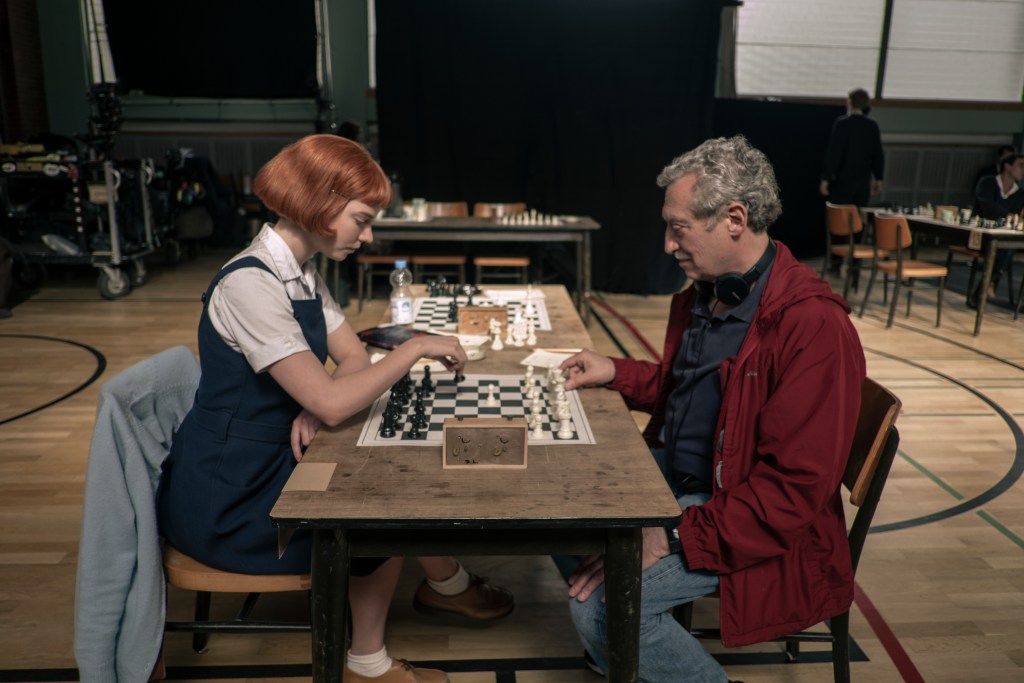
Anya Taylor-Joy as Beth Harmon works with chess expert Bruce Pandolfini, who’d actually consulted with author Walter Tevis on the original book. Pandolfini came in to oversee the chess in the Netflix series too, with support from Garry Kasparov and others. Photo: Phil Bray/Netflix © 2020
Chapter 8: Get this thing made or die trying
ALLAN SCOTT: One day, I thought I wasn’t feeling well, and I said to my wife, “It can’t possibly be COVID because I had that.” She said, “Yes, but you had it eight months ago. It could be back.” “No, no, no,” I said. Eventually we had to call an ambulance. I was begging the paramedics, “Please don’t take me to the hospital. Just don’t take me to the hospital.” If I went into the hospital feeling as ill as I was, I wasn’t going to come out except in a wooden box.
I went into the hospital on a Tuesday or Wednesday, and Thursday night was the premiere of The Queen’s Gambit on British television. I was, then, barely conscious, the TV didn’t work in my bed, and frankly, I was so unwell that I didn’t watch it.
BILL HORBERG: To see the next day on a little box on my computer screen, it was listed as number one Netflix in America. I was trying to call Allan and just let him know, and I wasn’t getting an answer from him.
ALLAN SCOTT: I not only didn’t see it, I didn’t have the pleasure of reading the reviews or anything. At one point, one of the nurses asked, and said, “What is it?” And I said, “It’s a series called The Queen’s Gambit.” And she was sweet, two days later, she came back and said, “Oh, it’s wonderful. I saw it.” So that was nice.
BILL HORBERG: They were all buzzy and excited and they were going, “God, we’ve been number one for the last 10 days.” And I go, “Yeah, but what does that mean? Is that a hit? How many people have seen it?” And they were laughing, and they go, “Yeah, it’s very successful, Bill. It’s very, very successful.”
ALLAN SCOTT: It wasn’t until I came out of hospital about 10 days later that I was able to watch. But by that time the excitement of the successes of the show had been made clear. So I just woke up in a pot of jam, as they say.
Chapter 9: The end game
BILL HORBERG: The great paradox of The Queen’s Gambit is how could something that takes 30 years to get made, come into the world at exactly the right time. It’s almost like the project waited for the world to arrive at a moment where it could not only get made, but break all the records and be seen by 100 million people.
ALLAN SCOTT: The only good news is that I’m absolutely convinced that if there’s a good project out there, it’s almost never not found. There are too many people like us looking for good projects. And I promise you, if we find them, we know right away, and we try and acquire that material or bring that person into the business.
However despairing you are on your 28th submitted screenplay that didn’t get a buyer, keep going because a good one, I promise you, somebody there is looking for it. Keep doing it, keep doing it, keep doing it. Persevere and learn and do. Keep going.
JUNE COHEN: I want to thank Allan and Bill for sharing the story of this creative journey with us. And I want to thank you for listening. I hope you found things in the story that you can bring into your own work.
Whether it’s the way Allan and Bill both fell head over heels in love with The Queen’s Gambit and couldn’t let it go. Or the way they embraced the potential of a mini-series, even though it wasn’t their original idea.
Or maybe it’s just the way that collaborator after collaborator fell through – sometimes in heart-breaking ways – but the ultimate combination created almost magically perfect conditions. They did find the right people at the right time with the right elements to bring it to life, which gives credence to Allan’s final advice: Keep going.
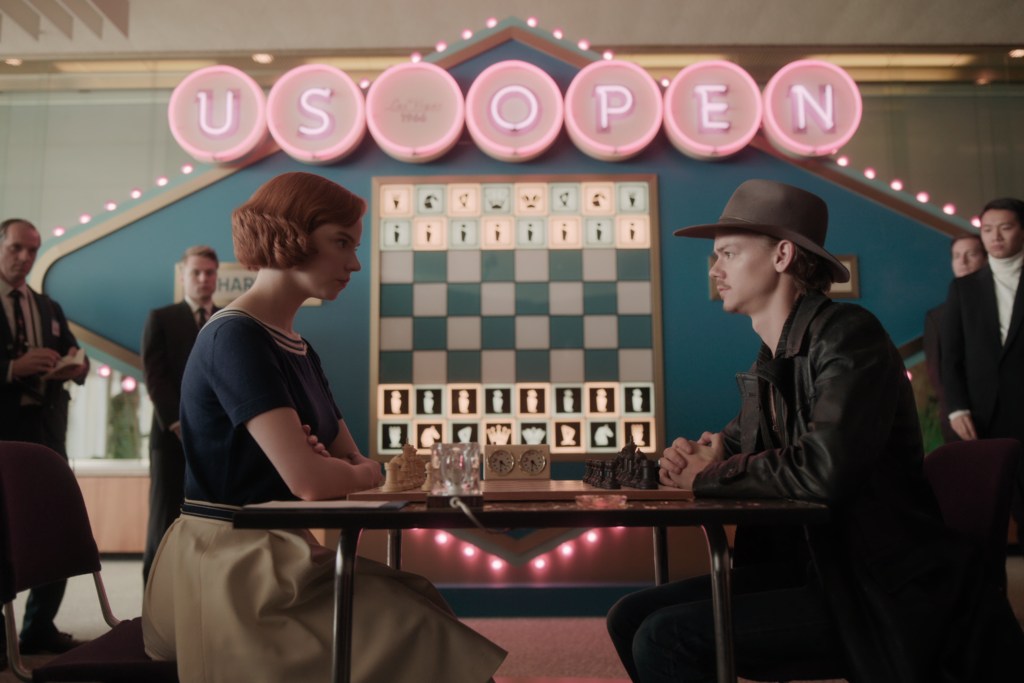
Anya Taylor-Joy as Beth Harmon, and Thomas Brodie-Sangster as Benny, in a pivotal match from the show – a match that begins to teach Beth the importance of finding the right team. Photo: Ken Woroner/Netflix © 2020
